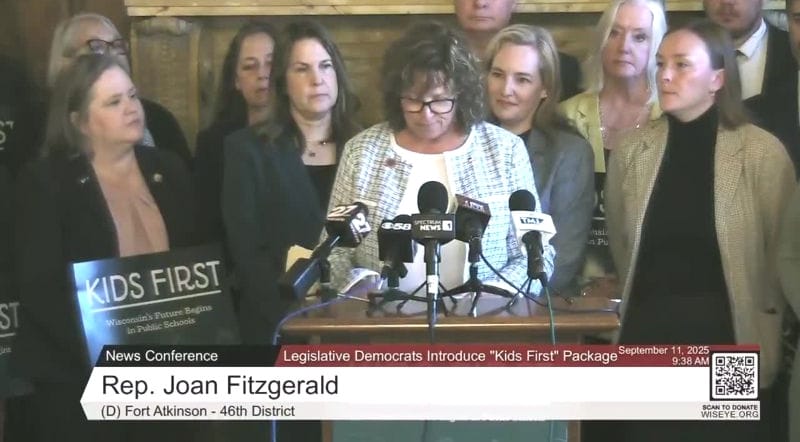Dems introduce Kids First bill for aid to public schools, students
Package of legislation addresses funding shortages, taxpayer transparency and kids' nutritional needs

Legislative Democrats introduced a package of bills that would increase funding for public schools. The “Kids First” package, presented at a September 10 press conference, would increase state general aid to schools, require voucher-cost transparency on property tax bills, and provide universal free breakfast and lunch.
In response to the latest state budget’s zero increase in funding for public schools, Democrats introduced LRB-4626, which would provide more money in general aid, including an inflationary bump, to cover Gov. Evers’ per-student increase from the previous budget. Evers used his veto power to raise the school revenue limits by $325 per student in 2023. But with no additional state funding this year any district that chose to utilize that increase would need to raise property taxes.
“It’s true that property taxes are too high in Wisconsin, but there is a reason for that,” said Senator Kelda Roys (D-Madison). “And it's 15 straight years of total Republican control of this legislature where they have slashed funds to public schools and forced local property taxpayers to foot the bill. During the same period, they've shoveled billions of taxpayer dollars that were meant for our public schools to unaccountable voucher schemes.”
The bill also earmarks $30 million for the two-thirds of the state’s school districts whose aid was reduced in the budget. The cost of the bill would be approximately $500 million per year. Legislators stressed that the action was not a complete solution to the systemic underfunding of public schools but merely a step in the right direction.
“Our educators are doing everything they can and continue to hold the system together on sheer will and personal sacrifice,” said Peggy Wirtz-Olsen, President of the Wisconsin Education Association Council. “Increasing general aid is the most direct, effective way to provide relief, not just to schools, but also to local taxpayers who've been asked to carry too much of the burden for far too long.”
The Voucher Transparency bill (LRB-4318) would require property tax bills to itemize the cost to taxpayers for private school vouchers. Currently, the voucher cost is not separated out from the public school amount. The bill, lawmakers said, seeks to empower taxpayers with information to make informed decisions about school referendums and to understand how state funding decisions impact their local schools.
“The people of Wisconsin deserve to know just how much of their tax dollars are going to private schools,” said Senator Dassler-Alfheim (D-Appleton). “We already have the cost of public schools on property tax bills. All this does is apply this measure of accountability to private schools as well. Most people have no idea how much is coming out of their taxes and going to private schools, and that’s a problem.”
In the 2024-25 school year, $22.5 million was diverted from the Appleton Area School District, Menasha Joint School District, Neenah Joint School District, and Oshkosh Area School District to private schools. In total, the state spent over $342 million on the voucher program, not including the other parental choice programs.
The Green Bay Area School District will begin reporting voucher costs on this year’s property tax bill. The Voucher Transparency bill would extend the same process statewide.
The Health School Meals bill, Senate Bill 67, which has been previously introduced by legislative Democrats, would lower costs for families by providing a nutritious breakfast and lunch at no cost for every student in Wisconsin. Feeding America estimates that one in six children in Wisconsin lives with food insecurity.
“In addition to being the right thing to do, making sure that hungry students are fed improves their ability to learn, reduces behavior issues at school, and makes the school environment better for teachers and students,” said Senate Minority Leader Dianne Hesselbein (D-Middleton)
Allison Path Harris, Farm-to-School Director at REAP Food Group, said that healthy school meals for all would not only nourish children but also drive economic growth by supporting local farms, creating jobs, and investing in local food economies.
The bill was referred to the Committee on Education and has yet to receive a public hearing.
According to Senator Hesslebein, the Kids First package is being brought forward to address the concerns of their constituents.
“We have a lot of things that we should be working on together in a bipartisan manner,” she said. “It’s a shame that Senate Republicans decided to be inactive and not in session at all this month. We're hoping they come back in October.”
Dems introduce Kids First bill for aid to public schools, students © 2025 by Carol Lenz is licensed under CC BY-NC-ND 4.0






